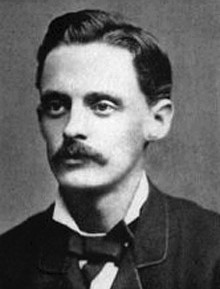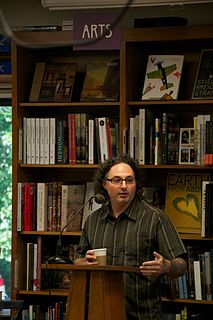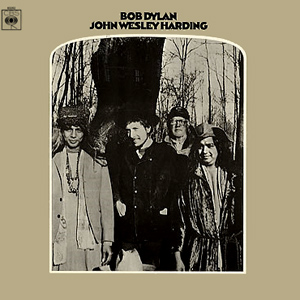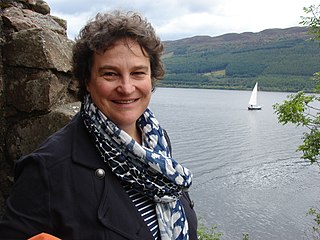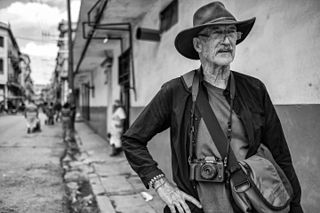Top 588 Publish Quotes & Sayings - Page 10
Explore popular Publish quotes.
Last updated on April 15, 2025.
Once upon a time, an editor could try out one or two wacky books, knowing full well that their list would counterbalance any risk with a stable of best-sellers and safe bets. Nowadays, every book must earn its own bread. With low overheads and an often episodic operating status, the small independent press is nicely placed to snap up the most innovative literature going at the moment. To take the risks. Meaning that small presses are no longer just outfits set up to publish your or your friends' work. They have something genuinely important to offer.
NEW RULE: 'Kidiots' Leave the children behind. At least until they learn something. A new study has shown that half of American high schools agree that newspapers should only be able to publish government-approved material. Almost one out of five said people should not be allowed to voice unpopular opinions..This is the first generation after September 11th, who discovered news during a 'watch what you say' administration...George W. Bush once asked, 'is our children learning.' No, they isn't. A better question would be, 'is our teacher's teaching?
Despite wanting to work in publishing, I was a publisher's worst nightmare: I rarely bought new books. So my goal was to publish the kind of books I would buy, and read. My reading habits have changed since starting the press. The only other "goal", per say, is to continue to experiment. I don't want the press to ever fall into a formula, or to be pigeonholed - "They do great reissues of modernist poets!" - I want to keep pushing, exploring the kind of title we can get away with. And working with authors who challenge the way I think about writing, editing and reading.
I thought I could capture the stories of the city on paper. I thought I could write about the horrors of the city. Horror stories you see. I tell you I didn't have to look far for material. Everywhere I looked, there were stories hidden there in the dark corners. . . . I wrote and still there were more. . . . No one would publish them. 'Too horrible,' they said. 'Sick mind,' they said. I thought I could write about the horrors of the city but the horror is too big and it goes on forever.
My writing is of a very different kind from anything I've heard about. All this mythological material is out there, a big gathering of stuff, and I have been reading it for some forty- or fifty-odd years. There are various ways of handling that. The most common is to put the material together and publish a scholarly book about it. But when I'm writing, I try to get a sense of an experiential relationship to the material. In fact, I can't write unless that happens ... I don't write unless the stuff is really working on me, and my selection of material depends on what works.
I think blogging and the ability to instantaneously respond to news items has changed the way we approach all media. We're seeing people talking back to columnists, and going much further in the sexual realm than most papers, even alternative weeklies, will publish. I'm surprised more papers aren't having people do what you're doing with an online only column, and to be honest, I read almost all the media I do read online, and plenty of other people do, too, so I don't know what's stopping them.
Shall an invention be patented or donated to the public freely? I have known some well-meaning scientific men ... to look askance at the patenting of inventions, as if it were a rather selfish and ungracious act, essentially unworthy. The answer is very simple. Publish an invention freely, and it will almost surely die from lack of interest in its development. It will not be developed and the world will not be benefited. Patent it, and if valuable, it will be taken up and developed into a business.
It's interesting to me that really one of the first things she [Eleanor Roosevelt]did as First Lady was to collect her father's letters and publish a book called The Letters of My Father, essentially, hunting big game, The Letters of Elliott Roosevelt. And it really was an act of redemption, really one of her first acts of redemption as she entered the White House. She was going to redeem her father's honor. And publishing his letters, reconnecting with her childhood really fortified her to go on into the difficult White House years.
Comrades! The kulak uprising in your five districts must be crushed without pity. You must make example of these people. (1) Hang (I mean hang publicly, so that people see it) at least 100 kulaks, rich bastards, and known bloodsuckers. (2) Publish their names. (3) Seize all their grain. (4) Single out the hostages per my instructions in yesterday's telegram. Do all this so that for miles around people see it all, understand it, tremble, and tell themselves that we are killing the bloodthirsty kulaks and that we will continue to do so ...Find tougher people.
I do believe that the collapse of the traditional media is catastrophic for our democracy, but I wasn't about to mythologize it. I understand its structural flaws, and the lies it tells, which are primarily, but not always, the lies of omission, and I wasn't going to leave that out. Knopf offered to publish the book but they said that an editor was going to "take out all the negativity," which, of course, I wasn't going to accept. I had been paid half my advance, and I had Nation Books buy the manuscript for that half.
My Lord, I have nothing to do in this World, but to seek and serve thee; I have nothing to do with a Heart and its affections, but to breathe after thee. I have nothing to do with my Tongue and Pen, but to speak to thee, and for thee, and to publish thy Glory and thy Will. What have I to do with all my Reputation, and Interest in my Friends, but to increase thy Church, and propagate thy holy Truth and Service? What have I to do with my remaining Time, even these last and languishing hours, but to look up unto thee, and wait for thy Grace, and thy Salvation?
Love your material. Nothing frightens the inner critic more than the writer who loves her work. The writer who is enamored of her material forgets all about censoring herself. She doesn't stop to wonder if her book is any good, or who will publish it, or what people will think. She writes in a trance, losing track of time, hearing only her characters in her head.
If Google decided at any point to publish my search history, or your search history, or anyone's search history, there's a litany of things they could idea police you about, and if it was published, you would be publicly shamed. Everyone would be publicly shamed. But we trust Google, and we trust the people that run that company.
Most beginning writers - and I was the same - are like chefs trying to cook great dishes that they've never tasted themselves. How can you make a great - or even an adequate - bouillabaisse if you've never had any? If you don't really understand why people read mysteries - or romances or literary novels or thrillers or whatever - then there's no way in the world you're going to write one that anyone wants to publish. This is the meaning of the well-known expression "Write what you know."
We believe we're moving out of the Ice Age, the Iron Age, the Industrial Age, the Information Age, to the participation age. You get on the Net and you do stuff. You IM (instant message), you blog, you take pictures, you publish, you podcast, you transact, you distance learn, you telemedicine. You are participating on the Internet, not just viewing stuff. We build the infrastructure that goes in the data center that facilitates the participation age. We build that big friggin' Webtone switch. It has security, directory, identity, privacy, storage, compute, the whole Web services stack.
Main thing is to publish. Blog, tweet, write, photograph, tweet, video, code, play around with data - or a combination of all of the above. a) it will keep your journalistic ‘muscle’ in practice. b) if you’re any good, you’ll get noticed. And bear in mind you can do these things at other places than conventional news organisations. Many businesses, NGOs, arts organisations, public bodies, universities, etc are now publishers of extremely high quality stuff. Good places to practise your craft before moving on.
I like making series, for a couple reasons. One, the repetition of routine is very healthy because I can get a little crazy; I want to be making things all the time. And if I publish something every week, I don't have to put every idea I have into one piece. It's more like, here's one idea: execute it, see it through, think about it, do it the best you can. And then there are going to be ten more ideas that come while you're making that, because creativity works that way.
I want to keep growing as a writer. I find myself doing unexpected projects and sort of challenging my idea of where I am in my career, or what I'm supposed to be doing. In fact, I'm not supposed to be doing anything. Just finding projects that are challenging to me. I want to be a writer who keeps growing and figuring out new things and hopefully people will follow me along as I publish these things.
We hold these truths to be self-evident, that all men are created equal, that they are endowed by their Creator with certain inalienable rights, among these are life, liberty, and the pursuit of happiness, that to secure these rights governments are instituted among men. We...solemnly publish and declare, that these colonies are and of a right ought to be free and independent states...and for the support of this declaration, with a firm reliance on the protection of divine providence, we mutually pledge our lives, our fortunes, and our sacred honour.
Basically, I've reached the point where I've lost any direct relationship to any of the editors I used to have. I suspect I'll have to pay to publish this myself, and I think a lot about about putting out fifty copies. I used to think about hogwash like my legacy and silly things like that. But I feel like if I never have another book out, I've done okay, I've had like twelve or thirteen little books, and I won't be upset about this on my death bed.
Such is professional jealousy; a scientist will never show any kindness for a theory which he did not start himself. There is no feeling of brotherhood among these people. Indeed, they always resent it when I call them brother. To show how far their ungenerosity can carry them, I will state that I offered to let Prof. H--y publish my great theory as his own discovery; I even begged him to do it; I even proposed to print it myself as his theory. Instead of thanking me, he said that if I tried to fasten that theory on him he would sue me for slander.
I'd known the people at Rolling Stone for a while. I'd gone to them with a piece I'd done on Beirut for Vanity Fair that Vanity Fair didn't want to publish, because they said I was making fun of death... This was Tina Brown.But they paid me for it. So I've got this big chunk of a piece, and Rolling Stone liked it, but they thought it was a little dated. But then they called me back and asked me to do a similar piece about the Turks and Caicos Islands, where the whole government had been arrested for dope smuggling. That was fun.
The reason I did the name change is simple. I wrote a bunch of autobiographical material and I was really enjoying myself doing it, and in two of the songs I quote two different people (referring to me as Mr. Stace). And it just hit me at some point that it was ludicrous for me to think of myself as Wesley Stace, publish novels as Wesley Stace, be Wesley Stace and not have it released as Wesley Stace.
Read non-fiction. History, biology, entomology, mineralogy, paleontology. Get a bodyguard and do fieldwork. Find your inner fish. Don't publish too soon. Not before you have read Thomas Mann in any case. Learn by copying, sentence by sentence some of the masters. Copy Coetzee's or Sebald's sentences and see what happens to your story. Consider creative non-fiction if you want to stay in South Africa. It might be the way to go. Never neglect back and hamstring exercises, otherwise you won't be able to write your novel. One needs one's buttocks to think.
Before the internet, a journalist would write an article about a company that the company felt was unfair and missed a point. All they could do was write a letter to the editor and wait, and maybe a week later it would be printed, or not. Now, they can go to medium.com and immediately publish a long rebuttal, saying the journalist forgot this and did not consider that, the analyst is wrong here. Everybody pulls that immediately into the debate. So it is a much more democratic field for ideas.
When you publish a book, you do so in part to end the silence. All censorship is silence. I would never, as an author, feel right requiring a young person whose family would object to the book to read it. Just as I would never force that person to read it, I would ask those folks to not force others not to read it. To me, that is just good manners.
The First Amendment guarantees liberty of human expression in order to preserve in our Nation what Mr. Justice Holmes called a "free trade in ideas." To that end, the Constitution protects more than just a man's freedom to say or write or publish what he wants. It secures as well the liberty of each man to decide for himself what he will read and to what he will listen. The Constitution guarantees, in short, a society of free choice.
Whether these were liberal publications or conservative publications, whether they were mainstream or slightly to the side of the mainstream; out of the mainstream, they all believed that they had the right to tell you how to stylize yourself. And from the New York Times to the much more left-winged nation. And The Voice said, no, whatever you want to. You drew whatever you want to, we'll publish it. Nobody was doing that. Nobody does it today. The Voice is no longer that paper, and editorializing is now in the hands of editors, with few exceptions.
The Zionist movement did not send any assistance, financial or otherwise, for the victims of Nazism and it did not allow any other side to provide any kind of aid. The Zionist movement concealed the information that came from within the ghetto walls and concentration camps, news that shed light on what was really happening. If it had to publish anything, it did so by questioning that information and diminishing its importance.
In the war time many of the publishing houses were privately owned, a single publisher or a publisher and a few associates who were responsible for everything. They could take whatever risks they wanted, could essentially publish what they liked according to their taste. Publishers today are working for big corporations. They have different pressures. I don't think they can make decisions quite as independently as they used to be able to. They have more corporate and financial responsibilities weighing on them. They're not free to go broke or go to jail.
The delicate muses lose their head if their attention is once diverted. Perhaps if you were successful abroad in talking and dealing with men, you would not come back to your bookshelf and your task. When the spirit chooses you for its scribe to publish some commandment, it makes you odious to men and men odious to you, and you shall accept that loathsomeness with joy. The moth must fly to the lamp, and you must solve those questions though you die.
Most of the photographs I make are personal pictures and never end up in print. Even the magazines I shoot for on assignment publish very few of the actual selects. Sometimes these personal pictures will end up in a book of my work. Oftentimes, however, they are simply photographs which I hope resonate, yet rarely find a publication home. I do a lot of personal work in Rio de Janeiro, and this of a parkour artist making a jump on Ipanema Beach is such a moment.
Knowledge of the truth I may perhaps have attained to; happiness certainly not. What shall I do? Accomplish something in the world, men tell me. Shall I then publish my grief to the world, contribute one more proof for the wretchedness and misery of existence, perhaps discover a new flaw in human life, hitherto unnoticed? I might then reap the rare reward of becoming famous, like the man who discovered the spots on Jupiter. I prefer, however, to keep silent.
I notice that I only publish once every four years. It takes a couple of years to write a book and then, for me, for one reason or another, it usually takes about a year of sort of dicking around before I start up. I write a review or little magazine pieces and touring with the other book. But mainly it's just you're not ready, I'm not ready to start another. You're just not up for it.
The dirty little secret about comics is that the wall to getting published is actually not that high. You can publish your own comic. You can have your comic printed by the same people that print Marvel and DC and Image's comics for, I think, it's about $2,000 for a print run. So you can Kickstart it and get your own comic made. It depends on what is considered success to you. So if you need to be published by the Big Two to feel that you've made it, well, you should start working very hard.
What really worries me is that those who are in positions of power are not really affected by what we are writing. In the moral dialogue you want to start, you really want to involve the leaders. People ask me: "Why were you so bold as to publish A Man of the People? How did you think the Government was going to take it? You didn't know there was going to be a coup?" I said rather flippantly that nobody was going to read it anyway, so I wasn't likely to be fired from my official position. It's a distressing thought that we cannot engage our leaders in the kind of moral debate we need.
After you publish a book, you become a writer and you're supposed to take it very seriously. You're supposed to show up at your desk - although frankly, I don't have a desk, I write in bed - you're supposed to show up at your bed and produce work. I think it's a little bit like work. I like to have fun with it, do things like make silly book trailers. I don't want to take this too seriously.
For books [Charles Darwin] had no respect, but merely considered them as tools to be worked with. ... he would cut a heavy book in half, to make it more convenient to hold. He used to boast that he had made Lyell publish the second edition of one of his books in two volumes, instead of in one, by telling him how ho had been obliged to cut it in half. ... his library was not ornamental, but was striking from being so evidently a working collection of books.
At 13 years old, I realized I could start my own band. I could write my own song, I could record my own record. I could start my own label. I could release my own record. I could book my own shows. I could write and publish my own fanzine. I could silk-screen my own T-shirt. I could do this all myself.
Khairani Barokka is a writer, spoken-word poet, visual artist and performer whose work has a strong vein of activism, particularly around disability, but also how this intersects with, for example, issues of gender - she's campaigned for reproductive rights in her native Indonesian, and is currently studying for a PhD in disability and visual cultures at Goldsmiths. She's written a feminist, environmentalist, anti-colonialist narrative poem, with tactile artwork and a Braille translation. How could I not publish that?
I never had a plan, except to write. I love what I do, and have from the beginning. Loving what you do makes it a lot easier to work, every day, to face the tough spots and heel in for the long haul. Nothing against plans; they work for some people. But for me, if I'd been planning, worrying about numbers, trying to micro-manage my career, I wouldn't have focused on the writing. If you don't write, you're not read. If you're not read, you don't sell. So that's my Master Plan, I guess. Write the books, let the agent agent, the editor edit, the publisher publish.
Therefore, is thy brother a sinner? Then cover his sin and pray for him. Dost thou publish his sins, then truly thou art not a child of your merciful Father; for otherwise thou wouldst be also as he, merciful. It is certainly true that we cannot show as great mercy to our neighbor, as God has to us; but it is the true work of the devil that we do the very opposite of mercy, which is a sure sign that there is not a grain of mercy in us.
If anyone ever wonders why there's nothing coming from me, it's not my fault. I'm doing the work. No, I haven't deteriorated or gone insane. Suddenly, I just can't get anything into print. And apparently I'm not alone in this. There are people of very high standing, authors who are having problems. So I have been told. In my own case, the more disturbing element is the editor-in-chief who said to me, "I think this book is terrific. It ought to be in print. I can't publish it -- I've been told I mustn't." The indication is that I'm not writing what people want to read, but I never did.
I think people are much more concerned about money now. There aren't the big advances of the past. You feel the sense of nervousness about the book industry. It's not like before. Not that I knew very much about what it was like because I was a newcomer to it, but I get that feeling that people are more conservative in their book choices and what they are going to publish and what's a sure sell. As opposed to - just like in the economy - a sense of luxury and sense of risk taking ten years ago.
There has to be a kind of grassroots push, a movement, as it were, against the inherent isolationism of American capitalism as practiced in the publishing industry. There need to be grants and government support and a few publishers, mainstream and independent, who are not afraid to challenge American readership. We need to build a network of translators, publishers and readers. We hope that our annual anthology might provide an upsurge in interest for European fiction and then, as we publish it every year, become a habit to many readers.
Dear Mia, What can I say? I don't know all that much about romance novels, but I think you must be the Stephen King of the genre. Your book is hot. Thanks for letting me read it. Anyone who doesn't want to publish it is a fool. Anyway, since I know it's your birthday, and I also know you never remember to back anything up, here's a little something I made for you. It would be a shame if Ransom My Heart got lost before it ever saw the light of day because your hard drive crashed. See you tonight. Love, Michael
If any ambitious man have a fancy to revolutionize, at one effort, the universal world of human thought, human opinion, and human sentiment, the opportunity is his own -- the road to immortal renown lies straight, open, and unencumbered before him. All that he has to do is to write and publish a very little book. Its title should be simple -- a few plain words -- My Heart Laid Bare. But -- this little book must be true to its title.
I own no TV stations, or Radio Stations or Newspapers. But I feel that people need to be educated as to what is going on, and to understand the connection between the news media and the instruments of repression in Amerika. All I have is my voice, my spirit and the will to tell the truth. But I sincerely ask, those of you in the Black media, those of you in the progressive media, those of you who believe in true freedom, to publish this statement and to let people know what is happening. We have no voice, so you must be the voice of the voiceless.





